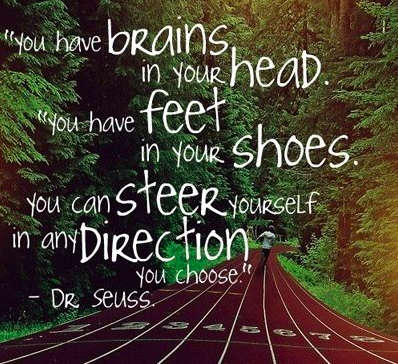On Willpower, part 2: 7 Ways To Strengthen Yours
Let’s say you want to start this season with a renewed focus on your fitness. You want to exercise every day. We all know experts say for wellness and weight loss, exercise every day is a non-negotiable. So, how would this work if something else came up?I used to preach that building healthy habits is the sole key to a healthy – and fit – life. And, I’m still convinced and counsel my clients that building healthy habits is the foundation for living a fit life. We are all made up of habits of language, gestures, foods, our gait, our morning and evening routine, and how we spend every single minute of our precious time. Some habits, or lifestyle choices, contribute to our wellness. Some do not. We all know which do and which don't. But I’ve recently dived into the world of willpower. Thriving companies like Starbucks train their coffee bar employees on it. Researchers have been studying it for decades. And we all know how it can have an impact on our health and wellness.As I outlined in part 1 of this series, over the past 20 years studies have found that willpower isn’t just a skill; it’s actually like a muscle. It can grow and be nurtured. Yes, it takes time and, yes, like any muscle, it gets tired. When it's tired, there is less willpower left in the bank to resist those not-so-good habits, such as marshmallows, cookies, that Netflix addiction at 10pm, or saying yes to anything you don’t really want to do.
But I’ve recently dived into the world of willpower. Thriving companies like Starbucks train their coffee bar employees on it. Researchers have been studying it for decades. And we all know how it can have an impact on our health and wellness.As I outlined in part 1 of this series, over the past 20 years studies have found that willpower isn’t just a skill; it’s actually like a muscle. It can grow and be nurtured. Yes, it takes time and, yes, like any muscle, it gets tired. When it's tired, there is less willpower left in the bank to resist those not-so-good habits, such as marshmallows, cookies, that Netflix addiction at 10pm, or saying yes to anything you don’t really want to do. Back to the kids with the marshmallows from part 1. When they were asked to avoid eating the marshmallow, the scientist gave them two resources: they could either draw, or they could envision a frame around the marshmallow so they could imagine it was just a picture, and not an actual marshmallow. Well, for 30 percent of the kids, it worked!So, your first two clues to building your willpower muscle:
Back to the kids with the marshmallows from part 1. When they were asked to avoid eating the marshmallow, the scientist gave them two resources: they could either draw, or they could envision a frame around the marshmallow so they could imagine it was just a picture, and not an actual marshmallow. Well, for 30 percent of the kids, it worked!So, your first two clues to building your willpower muscle:
Distract | Envision
Many studies have been conducted on why successful people have affairs and why doctors make life-threatening mistakes. And, yes, there are tens of thousands of studies (some by companies you might recognize such as Weight Watchers and Jenny Craig) on why some people are successful in their pursuits of “this” or “that” physique. It comes down to willpower.So why do normally successful people have affairs? They are most likely to start after a long day of using up their willpower “bank” at work or during the day. Often those same people expend much of their willpower on activities that tax their willpower and likely avoiding distraction to get the job done. The willpower is used so much during the day, the temptation is less likely to be met with resistance. Their willpower is done.Same goes for doctors. If they use all of their willpower to do other willpower-taxing things during their day, like avoiding distractions during a major surgery, their willpower is less available for surgeries later in the day. Mistakes happen and is can be the result of willpower that is tired or depleted.The chief scientist of the cookies versus radishes study, Dr. Mark Muraven, says “If you want to do something that requires willpower – like going for a run after work – you have to conserve your willpower muscle during the day.”Back to your exercise commitment. So what can we do to build this willpower muscle and avoid its depletion to live your most fit life? Try these seven tips:
It comes down to willpower.So why do normally successful people have affairs? They are most likely to start after a long day of using up their willpower “bank” at work or during the day. Often those same people expend much of their willpower on activities that tax their willpower and likely avoiding distraction to get the job done. The willpower is used so much during the day, the temptation is less likely to be met with resistance. Their willpower is done.Same goes for doctors. If they use all of their willpower to do other willpower-taxing things during their day, like avoiding distractions during a major surgery, their willpower is less available for surgeries later in the day. Mistakes happen and is can be the result of willpower that is tired or depleted.The chief scientist of the cookies versus radishes study, Dr. Mark Muraven, says “If you want to do something that requires willpower – like going for a run after work – you have to conserve your willpower muscle during the day.”Back to your exercise commitment. So what can we do to build this willpower muscle and avoid its depletion to live your most fit life? Try these seven tips:
1. Find a distraction
2. Envision “the finish line” or your version of FIT
3. Find a social network that supports your fitness goals
4. Make exercise and quality sleep non-negotiable daily activities
5. Build a “Wall of China” around YOU time
6. Don’t allow your willpower to be tempted too many times throughout the day
7. Save your willpower needs for those times you know it will be tested
With the seven tips above, you will most likely be successful. Your willpower gets stronger at avoiding unhealthy choices. You’ll eat healthier. You’ve not only exercised willpower by exercising, but built more willpower to help make healthy choices like saying “no” to other habits that don’t contribute to your wellness goals. 